
Can noisy festivals damage your hearing long term?
Festival season is in full swing, and thousands of music lovers will soon be flocking to Glastonbury, ready to revel and soak up the sounds. But can all those loud songs and thumping sound effects be detrimental to our hearing? “Attending a concert may give you more than you bargained for,” says Dr Deborah Lee, from Dr Fox Online Pharmacy. “A recent 2022 BMJ study showed one billion people around the world aged 12-34 are at risk of noise-induced hearing loss. With 24% of young people found to have unsafe listening practices with personal music devices.” She adds that 48% were attending noisy venues, such as nightclubs and concerts, at least once a month without noise protection. Dr Adam Hill, associate professor of electroacoustics, University of Derby, says: “While festivals are, for many, one of the most enjoyable features of the summer, care must be taken to avoid over-exposing yourself to high sound levels, as this could result in long-term negative social and health impacts. You need to ‘enjoy responsibly’,” Hill adds. How does noise exposure damage hearing? Noise-induced hearing loss (NIHL) is one of the most common causes of hearing loss. Our hearing depends on the function of tiny hairs inside the cochlea – a snail-shaped organ in your middle ear, explains Dr Lee: “Sound waves cause the fluid in the cochlea to reverberate, resulting in the movement of these very fine hairs. This generates electrical impulses, which lead to the perception of sound in the brain.” She says there are around 15,000 of these specialised hair cells in each cochlea. Once they have been damaged, they cannot regenerate. “We are all exposed to noise every day, but it’s loud noises above 85 dB that are likely to cause hearing loss,” notes Lee. “This could be a sudden explosion, or continuous exposure to loud noise, such as attending a concert, working in a noisy factory or listening to a personal music device at high volumes.” What are the signs you’ve been exposed to too much noise? There are a few tell-tale signs you’ve been exposed to too much noise at a festival. One of them is tinnitus. “If you have ringing in your ears after attending a festival. This could persist for one or two days after the event – and may become permanent after repeated exposures over many years,” says Dr Hill. Decreased sensitivity to sound is another thing you might notice. “Things sound quieter/muffled,” says Hill. “This usually takes one to two days to return to normal, but may become permanent after repeated exposure over many years.” He says you may also have difficulty understanding what someone is saying to you, especially in a noisy environment, and difficulty telling different sounds apart, like identifying multiple instruments when a band is playing. What can you do to protect your hearing at festivals? “Use earplugs. Ideally custom-made earplugs, which is what musicians use,” says Lee. “Cotton wool or foam rubber earplugs are ineffective. High-fidelity earplugs are a good option. These filter the sound without reducing the quality and provide ear protection.” This is especially important for babies and children at festivals – ear defenders are available to help protect their sensitive ears. Lee adds: “Take regular breaks away from the noise. For every 3 dB above 80 dB, the time you can spend exposed to the noise without it damaging your hearing is halved. “It’s safe to listen to noise at 80 dB for up to eight hours, so at 83 dB this time frame is reduced to four hours. If you do the maths, at the average concert, hearing damage could set in after just five minutes!” She suggests taking breaks such as going to the loo, getting a drink, or taking a walk away from the main body of the noise at regular intervals. And lastly: “Don’t stand within three metres of a loudspeaker.” What can you do if you’re already concerned? Regular festival goers may already have hearing concerns on their radar. “The best thing you can do is to go get your hearing tested,” advises Dr Hill. “This will give you an indication of whether you have any issues already.” If you enjoy going to festivals and other live music events on a regular basis, he says it would be wise to invest in some suitable reusable earplugs: “High quality earplugs will reduce the effect of the musical content equally, so it sounds the same but at a lower level.” If you are involved in the music industry in any way (even if you are a student), Hill suggests making use of the Musicians’ Hearing Health Scheme. He adds: “You can get a hearing test and high-quality bespoke earplugs for a significant discounted rate.”
2023-06-19 18:17
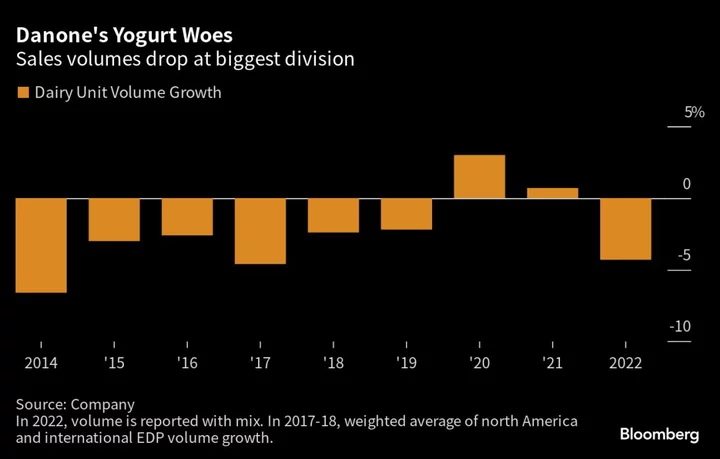
Danone Pins Turnaround Hopes on AI
Making the yogurt of the future requires a cast of 21st-century helpers: machine learning, gut science and even
2023-06-19 12:19

Dame Deborah James’ father recalls emotional conversation they had before she died
Dame Deborah James’s dad has recalled their conversation on the day she died, in an emotional new interview published on Father’s Day (18 June). James was diagnosed with incurable stage four bowel cancer in 2016, when she was 35. Using the moniker “bowel babe”, she campaigned tirelessly to raise awareness about the symptoms of the disease until her death on 28 June 2022. Her BowelBabe fund has raised over £11.3m for Cancer Research UK at the time of writing, and James was awarded a damehood last May for her activism. In an interview with The Sun, her father Alistair James explained how James was committed to living a full life until the very end. “She was always full of energy, the driving force in our family. She was always coming up with fun ideas, ways to make memories together,” he said. “She would create outdoor cinemas in the garden, plan last-minute holidays, throw impromptu parties – it was never-ending.” James was receiving palliative care at her parents’ home in Surrey in the weeks before her death. “We all knew how desperate it was and we did have some desperately sad times. But we all made sure there were lots of good times, too,” Alistair told the outlet. He also reflected on the day James died, with him and his wife Heather by her side. “Heather suddenly called for me, telling me it was happening and I needed to come now. Saying goodbye was very hard, but it was peaceful,” the 67-year-old said. “Right towards the end, I told her, ‘You can let go now, you have done enough. You can sleep’. I’d never said anything like that before.” Their Father’s Day celebrations usually involved watching sports together, Alistair said. “I remember her taking me to The Ashes cricket four years ago. She loved every minute of it. We loved days out at Wimbledon together,” he continued. “It’s those things that I’ll really miss.” Alistair also expressed his sadness for James’s husband Sebastian, and their children Hugo and Eloise, who will miss out on celebrating many milestones together. James called Alistair “my unsung hero” in a moving post on Father’s Day last year – days before she died. She shared a picture of him brushing her hair, with a caption that read: “My dad is my unsung hero, more so than ever. He’s quietly there behind the scenes, making sure I am OK.” Earlier this year, an impactful documentary chronicling James’s campaign efforts was released on BBC Two. BowelBabe in Her Own Words stitches together 100 hours of recordings – from James’s podcast You Me, and the Big C, her Instagram and TikTok videos, text messages, voice notes and old home videos – to tell the activist’s story. Read More I’m about to experience my first Father’s Day without my Dad Adam Kay says his ‘life has been transformed’ after ‘welcoming two young babies’ via surrogate Prince William all smiles as he’s pictured with his children to mark Father’s Day Alan Carr’s ex Paul Drayton criticises comedian’s ‘really nasty’ comments about friendship with Adele Somehow everyone has become a body language expert
2023-06-18 19:58
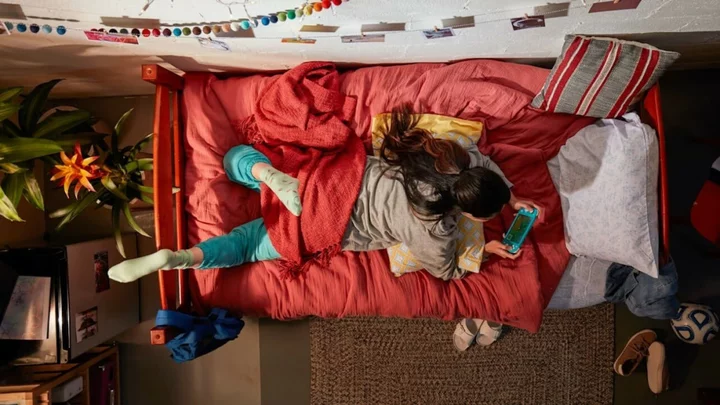
How to Use Bluetooth Headphones With the Nintendo Switch
Wireless audio finally landed on the Nintendo Switch in 2021, and while it's nice to
2023-06-18 19:47
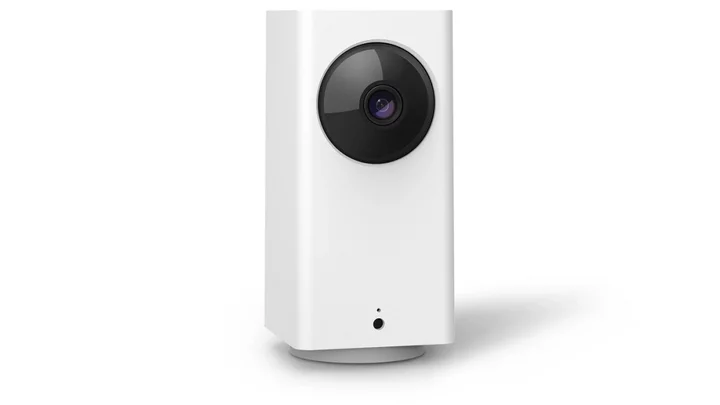
Roku Indoor Camera 360° SE Review
Part of Roku's growing lineup of home security products, the Indoor Camera 360° SE ($39.99)
2023-06-18 00:16

The University of Wisconsin-Madison Is Hiring a Cheese Taste-Tester
This dairy lovers’ dream job requires tasting up to 24 cheeses and a dozen pizzas per week.
2023-06-17 05:15
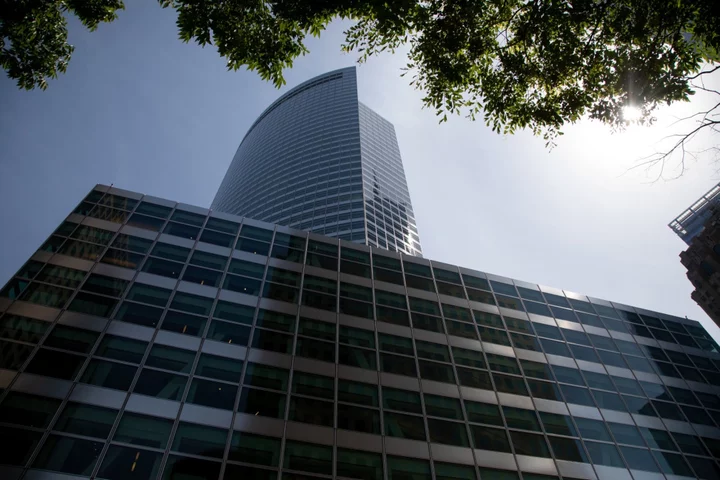
These Are The Top-Ranked Employers for Working Fathers on Wall Street
Bank of America Corp., Goldman Sachs Group Inc. and Morgan Stanley are among Wall Street firms that offer
2023-06-17 02:49

Eric Schmidt Buys Abandoned Alfa Nero Superyacht for $67.6 Million
Former Google CEO Eric Schmidt bought the Alfa Nero superyacht that was ditched in Antigua in March 2022
2023-06-17 00:25
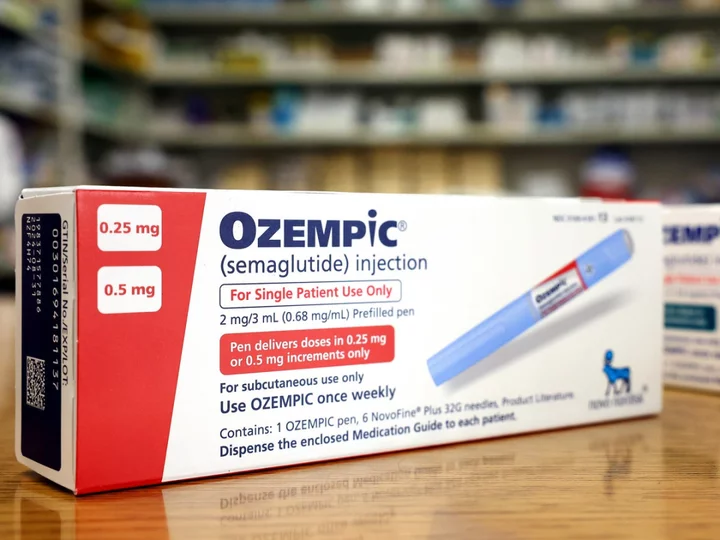
Scientist behind Ozempic says drug can make life ‘so miserably boring’
One of the scientists whose work pioneered the development of medications such as Ozempic and Wegovy has revealed why life may become “so miserably boring” after two years of using the drug. Ozempic is an FDA-approved medication used for the treatment of type 2 diabetes. It works by mimicking a hormone called glucagon-like peptide 1 (GLP-1), which regulates blood sugar levels and slows down the rate at which food leaves the stomach, often creating the feeling of fullness. These semaglutide injections – sold under the brand names Ozempic and Wegovy – have soared in popularity as many people, including Hollywood celebrities, have used it for weight loss. What’s more, people have also found Ozempic has been effective in curing their addictive habits, like drinking, smoking, shopping, or nail biting. However, because of Ozempic’s increasing popularity, it has led to national shortages of the type 2 diabetes treatment – leaving those who actually need it without. In an interview with Wired, professor Jens Juul Holst – who received the Warren Alpert Foundation Prize in 2021 for his work developing treatments based on the GLP-1 hormone – spoke about the effects of Ozempic, and why he believes many people will stop taking the medication after just a few years. “What happens is that you lose your appetite and also the pleasure of eating, and so I think there’s a price to be paid when you do that,” Holst told Wired. “If you like food, then that pleasure is gone. The craving for food for some people is taken away when they take GLP-1 drugs.” He continued: “That may eventually be a problem, that once you’ve been on this for a year or two, life is so miserably boring that you can’t stand it any longer and you have to go back to your old life.” Holst added that medications like Ozempic and Wegovy have been on the market since 2005, though studies show that these people don’t stay on them for very long. “It’s just like every other drug, they don’t stay on it for many reasons,” he explained. “One of the reasons, as I said, is that once you have tried it and you realise you’ve lost interest in food, then that may be enough.” “We don’t know why people stop taking these drugs, but we know for a fact that they do stop. They do that all over the world.” A 2020 study found that 70 per cent of people who took GLP-1 drugs for type 2 diabetes stopped taking them within two years. However, this could pose a problem for many patients taking semaglutide injections. Research has found that people who stopped taking Ozempic or Wegovy for weight loss experienced weight rebound. A trial published in April 2022 saw participants gain back two thirds of the weight they had lost after 68 weeks of taking semaglutide. As for celebrities who use the once-weekly injection for weight loss, despite not having diabetes or clinical obesity, Hans instead called attention to the “many terrible problems” that those with diabetes have struggled with by not having drugs like Ozempic readily available. “Have you ever visited a diabetes hospital? It’s really deplorable,” he said. “People come in with amputated limbs and compromised cognitive functions and heart problems or they can barely move – they’re miserable and depressed. It’s really serious. There is so much you can improve with a drug that is not only a weight-loss drug but is also an anti-diabetic.” Amidst the popularity of semaglutide injections, the US Food and Drug Administration has issued warnings for consumers not to use off-brand versions of Ozempic or Wegovy, because they may not include the same GLP-1 hormone used in approved medications. Earlier this month, agency officials reported problems with patients using compounded versions of semaglutide – which combines traditional semaglutide with other ingredients. These drugs are not FDA-approved, and the agency does not verify the safety or effectiveness of compounded drugs. Consumers should only use drugs containing semaglutide with a prescription from a licensed health care provider and obtained from a state-licensed pharmacy or other facilities registered with the FDA, the agency said. Read More What is ‘Ozempic face’? Doctors warn about facial ageing side effect of diabetes medications How does Wegovy work? The ‘game changing’ weight loss drug beloved by Hollywood FDA warns against using off-brand versions of Ozempic, Wegovy for weight loss Pregnant Stassi Schroeder admits she wants to ‘try’ Ozempic after giving birth Doctors warn about ‘Ozempic face’ side effect of medications Amy Schumer says she stopped taking Ozempic because of side-effects
2023-06-16 23:52

Cassette Beasts Review
Pokemon didn't invent the monster-catching role-playing game, but it's the biggest name in the genre.
2023-06-16 22:21

Price war: Amazon excludes rival Temu from competitive price checks
By Arriana McLymore NEW YORK Amazon is excluding its new competitor Temu from its price searching algorithm that
2023-06-16 21:56

Why do we get so tired in hot weather?
Does very hot weather leave you feeling more exhausted and lethargic than usual? There might be an initial surge of joy when the sun finally comes out – but once temperatures really creep up, we can end up feeling physically drained, wondering whether we should follow the Mediterranean’s lead and start introducing daily siestas. So, why does hot weather make us so tired? We asked a doctor to explain… Our bodies have to work harder in the heat “When the weather is hot, our bodies have to work harder to cool themselves down,” says Dr Zulqarnain Shah, medical director at SSP Health and GP at SSP Health practice Colne Road Surgery. “The body’s natural cooling mechanism involves increasing blood circulation near the skin’s surface and promoting sweat production. These physiological changes can lead to fatigue and a feeling of lethargy. It is essential to recognise that this fatigue is a normal response to heat and is typically temporary.” Dehydration Low energy and tiredness are also common when you’re lacking hydration. “Hot weather increases the rate of fluid loss through sweating, leading to dehydration. Dehydration can contribute to fatigue and make you feel even more lethargic,” adds Dr Shah. “To avoid this, it’s important to stay adequately hydrated by drinking plenty of fluids, especially water. Aim to drink even when you’re not feeling thirsty, as thirst is not always an accurate indicator of dehydration.” Heat exhaustion “Prolonged exposure to heat can result in heat exhaustion, a condition characterised by symptoms such as heavy sweating, weakness, dizziness, nausea, headache, and muscle cramps. If you experience these warning signs, it’s crucial to move to a cooler environment, drink fluids, and rest. If symptoms persist or worsen, seek medical attention promptly,” says Shah. It’s important to pay attention to warning signs, as if heat stroke develops, this is a medical emergency. Shah stresses: “Heat stroke is a severe and potentially life-threatening condition that requires immediate medical intervention. It occurs when the body’s temperature regulation fails, and the core temperature rises dangerously high. “Symptoms may include a high body temperature (above 39.4C), altered mental state, confusion, rapid breathing, rapid heartbeat, and even loss of consciousness. If you suspect heat stroke, call emergency services immediately.” Sleep deprivation The extra tiredness could also be linked to poor sleep, as this can really suffer in the heat. “Hot temperatures can disrupt sleep and lead to poor sleep quality. The body needs to cool down to initiate sleep, and the excessive heat can make it difficult to reach the optimal sleep temperature,” explains Shah. “To improve sleep in hot weather, consider using fans or air conditioning, wearing lightweight and breathable sleepwear, keeping your bedroom well-ventilated, and using lighter bedding.” Pre-existing conditions could get worse Many people living with chronic or long-term health conditions deal with fatigue, which may flare up during heatwaves. “Hot weather can exacerbate symptoms and increase fatigue in individuals with certain chronic health conditions. Conditions such as heart disease, kidney problems, and respiratory issues can be particularly sensitive to heat,” notes Shah. “It’s vital to be aware of your specific health condition and consult with your healthcare provider for personalised advice on managing your symptoms during hot weather. They may recommend staying in cooler environments, adjusting medications, or monitoring your fluid intake more closely.” Read More Airbnb customer furious after being charged extra over dog hair People seek hay fever advice once every three seconds, says NHS England Why is my hay fever so bad at the moment?
2023-06-16 20:18
